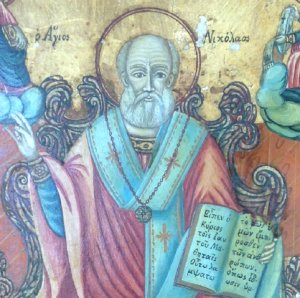Presented By: Classical Studies
Ann Arbor's First Orthodox Priest
A Story of Refugeehood, Migration, and the Ecumenical Riches of Greek-Orthodoxy in America

Who was the first Orthodox Priest of Ann Arbor, and what can we learn from his life story today? This talk will follow the twists and turns in the life of Father Agathangelos, the first Greek-Orthodox priest to serve the spiritual needs of Ann Arbor nearly a century ago, and reflect on its broader meanings for Greek Orthodoxy in America.
Father Agathangelos was born and raised in Ottoman Cappadocia (central Anatolia) at the end of the nineteenth century, but his life was upended with the Greco-Turkish Population Exchange of 1923 (whose centennial we honor this year). The Exchange was at the time an unprecedented act of ethnic cleansing: The Republic of Turkey stripped nearly one and a half million indigenous Anatolian Christians of their citizenship and uprooted them to Greece, which in turn stripped Greek citizenship from nearly half a million indigenous Muslims of Greece and uprooted them to Turkey. This Compulsory Exchange upended the lives of nearly two million souls and set an international precedent for partition and forced population movements in later decades.
This talk will follow the refugee life and migrations of Father Agathangelos -- who, in addition to being a priest, was also a poet, a novelist, and an iconographer -- through his artwork and the traces he left behind. His first and only fluent language was Turkish, which he wrote in the Greek alphabet, known as "Karamanlidika Turkish." His poetry and his art reflect the rich cultural confluence of Anatolia before the Exchange, and it was this culture that he carried with him into refugeehood and his later migration to the United States. What can his life tell us about the enumenical breadth and cultural riches of Greek Orthodoxy in America? You are all warmly invited to join in this lecture and to share your own perspectives in an open-forum Q&A afterward.
William Stroebel is an Assistant Professor of Modern Greek and Comparative Literature in the departments of Classical Studies and Comparative Literature at the University of Michigan. His research focuses on recovering the refugee literatures displaced by the Greco-Turkish Population Exchange of 1923. The lecture will be accompanied with refreshments and a reception after the Q&A.
Father Agathangelos was born and raised in Ottoman Cappadocia (central Anatolia) at the end of the nineteenth century, but his life was upended with the Greco-Turkish Population Exchange of 1923 (whose centennial we honor this year). The Exchange was at the time an unprecedented act of ethnic cleansing: The Republic of Turkey stripped nearly one and a half million indigenous Anatolian Christians of their citizenship and uprooted them to Greece, which in turn stripped Greek citizenship from nearly half a million indigenous Muslims of Greece and uprooted them to Turkey. This Compulsory Exchange upended the lives of nearly two million souls and set an international precedent for partition and forced population movements in later decades.
This talk will follow the refugee life and migrations of Father Agathangelos -- who, in addition to being a priest, was also a poet, a novelist, and an iconographer -- through his artwork and the traces he left behind. His first and only fluent language was Turkish, which he wrote in the Greek alphabet, known as "Karamanlidika Turkish." His poetry and his art reflect the rich cultural confluence of Anatolia before the Exchange, and it was this culture that he carried with him into refugeehood and his later migration to the United States. What can his life tell us about the enumenical breadth and cultural riches of Greek Orthodoxy in America? You are all warmly invited to join in this lecture and to share your own perspectives in an open-forum Q&A afterward.
William Stroebel is an Assistant Professor of Modern Greek and Comparative Literature in the departments of Classical Studies and Comparative Literature at the University of Michigan. His research focuses on recovering the refugee literatures displaced by the Greco-Turkish Population Exchange of 1923. The lecture will be accompanied with refreshments and a reception after the Q&A.